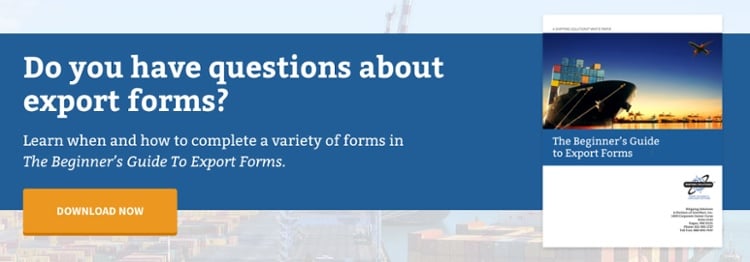The International Trade Blog Export Compliance
Accurate Export Documents Are Important to Your Company's C-Suite
On: August 26, 2019 | By:  David Noah |
5 min. read
David Noah |
5 min. read
Creating consistent, accurate export documents is crucial in ensuring your international shipments arrive on time and making sure you get paid quickly. While it’s often the export manager’s job to oversee this process, everyone in your company should be concerned that export documents are created the right way.
Here are three reasons getting your export documents correct is important to everyone at your operation, including your C-suite.
1. Incorrect Documents Can Slow Your Shipment and Delay Getting Paid for Your Exports
There is a cost associated with the time and effort it takes to redo mistake-filled export documents. Not only is it less efficient, it takes employees away from their other job duties, and it can delay how quickly your exports reach their ultimate destination. The longer it takes to ship, the longer it takes your company to get paid.
In addition, if your documents are inconsistent or inaccurate and you’re shipping under a letter of credit, you may have to file an amendment to the letter of credit to fix the mistake. This cost you money—the bank will charge you for the amendment—and it will also cost you time. The terms of the new letter of credit must be accepted by both parties, and if they’re not accepted, you will lose out on payment.
We've written extensively about the pros and cons of using letters of credit to get paid for your exports and the importance of properly preparing your paperwork:
- Methods of Payment in International Trade: Letters of Credit
- The Importance of Meeting Deadlines in a Letter of Credit
- 7 Common Mistakes When Preparing Letters of Credit
2. Incorrect Documents May Lead to Violations of Export Regulations
One of the most egregious things I hear exporters say is their company is “too small to be noticed” or they “don’t ship items that will get them in trouble.”
Wrong. Wrong. Wrong.
Even if you’re not shipping guns, weapons or biological substances, you’re not excused from export compliance.
Many exporters don’t understand that certain commercial items for non-military purposes can be classified as dual use. Despite being created for commercial purposes, these items can be adapted into something more destructive, and not getting the documentation right for these type of products is a huge—potentially devastating—mistake for your and your company.
In fact, incorrectly completing your documentation or failing to disclose pertinent information about your exports could result in the denial of export privileges, and criminal violators may be sentenced to prison for up to 20 years. In addition to these non-monetary penalties, mistakes in your export documentation could also cost you financially.
3. Incorrect Documents Can Cost You Money
According to the U.S. Department of Commerce’s Bureau of Industry and Security (BIS), fines for export violations can reach up to $1 million per violation in criminal cases, while administrative cases can result in a penalty amounting to the greater of $250,000 or twice the value of the transaction.
That’s enough to shutter most small and midsize businesses forever. Some companies take those risks without considering that, indeed, it could happen to them. Here’s one example from the BIS:
Mattson Technology, Inc.
The Violation: Between 2006 and 2008, Mattson Technology Inc. of Fremont, California, made unlicensed exports of pressure transducers classified as ECCN 2B230 to customers in Israel, Malaysia, China, Singapore, and Taiwan in violation of the EAR. The pressure transducers, valued at $78,000, were controlled for nuclear nonproliferation reasons.
This case cautions manufacturing and distribution partners to pay careful attention to compliance requirements when exporting controlled spare and replacement parts. Penalties related to the unauthorized export of spare and replacement parts can be as costly as those that arise from violations related to the export of complete systems and capital equipment.
Companies that authorize spare or replacement part shipments using license exceptions, including for replacement parts and equipment and for temporary exports, must ensure compliance with all of the requirements for authorized use of these exemptions as defined in the EAR.
The Penalty: In 2012, Mattson Technology agreed to pay $850,000 in civil penalties. The company voluntarily disclosed the violations and cooperated fully in the investigation, and $600,000 of the penalties were suspended.
The Bureau of Industry and Security (BIS) publication, Don’t Let This Happen To You, is filled with examples of businesses who took a risk with their export documentation and lost. Each highlights the detrimental effects of being out of compliance and underscores the need to closely watch and constantly review your company's export operation.
How to Avoid Penalties Caused by Inaccurate Export Documents
Before you can take steps to avoid export compliance violations, you need to understand what they are. While there are many different sets of U.S. government regulations that may touch exporters, there are three primary sets of regulations of which you need to be aware: the Foreign Trade Regulations (FTR), the Export Administration Regulations (EAR), and the International Traffic in Arms Regulations (ITAR).
These regulations govern what you may export, to whom you may export, how you must document, report, and maintain records of your export transactions. Our free white paper, What You Need to Know about Export Compliance, provides an introduction to these requirements.
Create an Export Compliance Program
Though most exporters don’t plan on doing something wrong in the eyes of the law, mistakes do happen—and the consequences can be devastating. Companies can face fines, lose their export privileges, and in the most egregious cases, see employees go to jail.
One way to make sure your export documentation process is covered is to create an Export Compliance Program (ECP). An ECP gives you a clear plan of how to audit your company's procedures and processes yourself, so you can identify and address any potential violations before they surface.
There are nine key elements of an ECP:
- Management commitment.
- Continuous risk assessment of the export program.
- Formal written export management and compliance program.
- Ongoing compliance training and awareness.
- Pre- and post-export compliance security and screening.
- Adherence to recordkeeping regulatory requirements.
- Internal and external compliance monitoring and periodic audits.
- A program for handling compliance problems, including reporting export violations.
- Appropriate corrective actions in response to export violations.
A well-written ECP can substantially reduce penalties if your company violates export regulations, as long as you can document that you regularly follow the written plan.
Create Accurate Export Forms with Export Software
Getting your export documents right includes following procedures for properly classifying your goods for export, determining whether or not your items require an export license, correctly submitting your electronic export information (EEI) through the Automated Export System (AES), and correctly completing the required export forms.
Thousands of successful exporters use the Shipping Solutions Professional export documentation and compliance software to manage this process. Not only will you be able to save your company from potentially expensive compliance mistakes, you’ll be able to finish your export paperwork faster and with fewer headaches. Let us show you how!
This article was first published in August 2016 and has been updated to include current information, links and formatting.

About the Author: David Noah
As president of Shipping Solutions, I've helped thousands of exporters more efficiently create accurate export documents and stay compliant with import-export regulations. Our Shipping Solutions software eliminates redundant data entry, which allows you to create your export paperwork up to five-times faster than using templates and reduces the chances of making the types of errors that could slow down your shipments and make it more difficult to get paid. I frequently write and speak on export documentation, regulations and compliance issues.





